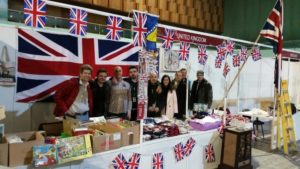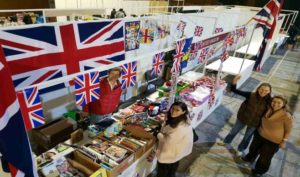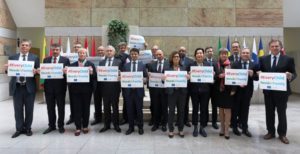27th October 2017
Every child needs a family
Autumn has come, and so my wife Caroline is busy organising this year’s Diplomatic Winter Bazaar, BiH’s biggest charity event. Last year, around 15,000 people crowded into Skenderija to eat, drink, play and shop at the stands manned by 40 Embassies as well as over 70 local NGOs and businesses. Thanks to generous sponsorship, including from British companies like EFT and Mineco, the 2016 Bazaar raised 130,000 BAM for children’s charities right across BiH. This year, we hope it will be even bigger and better.


Thanks to Caroline, I have been able to visit some of the charities supported by the Bazaar, and to see the wonderful work that they do for some of BiH’s most vulnerable children. In Banja Luka, for example, children with Downs Syndrome are now receiving life-changing speech therapy. In Sarajevo, children with complex special needs are able to access day care at the Christine Witcutt Centre, named after a Scottish aid worker killed by a sniper in June 1993. And in the Srebrenica region, SOS Children’s Villages BiH is working with families who are at risk of losing their children.
These charities are filling a gap. Coming from the UK, I have become accustomed to first-class social care, particularly for children. Here in BiH, although you have a generous welfare budget, a large proportion is spent on special categories like veterans. Families who are struggling with poverty, or with disabled children, often do not get much support. In fact, poverty and disability often go together, because many disabled children are brought up in single-parent families. When the father has walked out, it’s hard for mothers to work when they often need to provide full-time care for their children.
Sometimes, families feel they have no alternative but to give up their child, and put them into an institution. As a father myself, I can barely imagine how difficult things must be for a parent to make such an awful decision. My heart goes out to them. At the same time, however, the evidence shows that it is always better to keep a child in a family environment than to institutionalise them. It is particularly important that children under 3 years old, who are at a critical stage in their development, are never put into institutions.
I was pleased recently to give my support to an EU/UNICEF initiative called ‘Every Child Needs a Family’. The aim is to help BiH to implement the 2009 UN guidelines which state that whenever children are separated from their families, alternative care should be provided in family-based settings within the child’s community, rather than in residential institutions. One of the partners in the project, alongside the responsible Ministries and other NGOs, is Hopes and Homes for Children, a UK charity set up by a British soldier who served in BiH during the war.

UNICEF estimates that around 1,640 children in BiH are without parental care. What I find really striking is that almost two-thirds of those children have at least one living parent. According to research, parents are most likely to give up their children because of unemployment or poverty. In other words, this is often avoidable. It is extremely expensive to put a child into an institution; it would be much cheaper for the authorities to offer financial help to struggling families so that they can keep their children.
One thing about BiH’s system really shocked me. It is that parents who put their children into institutional care can refuse to allow them to be adopted. Sometimes, it’s true, children do return home to their families after a couple of years. But this is only a small minority. Many children who enter institutions will remain there for their whole childhood.
I heard recently about a very young child who is in a residential institution in BiH. The mother had agreed to allow the child to be adopted, but the father – a convicted war criminal, serving a long sentence – had refused to give his consent. Unless something changes, both father and child are now condemned to spending years in an institution. But the child is innocent, and surely deserves the love and stability that can best be provided by an alternative family.
Adoption is the best long-term solution for children who don’t live with their parents. But it is not always available or feasible. An alternative, particularly as a temporary measure, can be to put a child into family-based foster care. The new FBiH law on foster care passed earlier this year is a great step in the right direction, and complements the existing by-law in Republika Srpska. UNICEF are supporting both governments in recruiting and training foster families, who can play an invaluable role in supporting the social and emotional development of vulnerable children.
So much in this country seems so difficult to achieve, particularly at the moment. But perhaps, if we think more about the rights of children, rather than the rights of their parents, we can help BiH to turn from the past to the future. And, if nothing else, perhaps we could help more such children out of institutions and into new families that can offer them the best possible start in life.